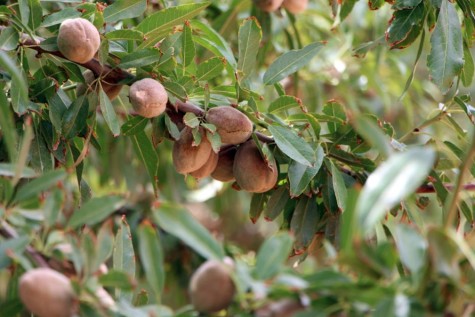“Almonds: A Nutty Industry for Drought-Afflicted California?”
November 17, 2015
California, our beautiful home, has been suffering from severe drought for about four years now. This change in California’s climate has affected the whole state, including Santa Cruz— lawns are brown, the plants are wilting, the air is dry, and every time you pass Lexington Reservoir the dropping water line is distinct. This severe drought in Santa Cruz has forced us to change our habits in an effort to conserve our limited water supply. Though people may be taking shorter showers, reusing sink water, or letting their plants wilt, do these actions truly make a difference?
California provides a large portion of the United States’ agriculture and all those crops require a significant amount of water. In fact, 40% of California’s water goes toward agriculture while less than 3% of the total water is used for residential purposes. One of the most prominent of these agricultural exports is almonds— just last year almonds were in the top two agricultural products of California, second only to milk. It takes a gallon of water to produce just one almond and 82% of the world’s almonds are grown in California. This small nut occupies 13% of California’s irrigated farmland and uses a whopping 9% of the state’s total agricultural water–a large chunk of the available water for agriculture considering that California produces about 15% of the United States’ agriculture.
Stackhouse Brothers Orchards, a local Santa Cruz almond farm, claims that they “use a minimum amount of water” in order to still keep their crops healthy. However, they still “flood irrigate” and have not changed the way they water their crops since the drought. Their almonds still require a significant amount of water.
Parker Elliott Wrede Dolton, a fellow PCS student, beloved by all, also happens to be a local almond investigator. He proclaims “Almonds? More like drought!” Dolton, like reporters of this article, believes that almonds are a wasteful agricultural product given our current drought conditions.
Almonds, like many other crops, are very strenuous on California’s severely drought-impacted agricultural industry. Obviously we cannot stop producing crops since food is a necessity of life, but we can choose to produce crops that are not water intensive. The almond industry needs to move to other terrains, national or global, that can accommodate the excessive water needs of this non-essential food crop. It is important that California make steps towards a more efficient way to farm that saves water. It is time we stand up to the real enemy– not showers and dishwashing, lawn watering and car washing, but almonds.



